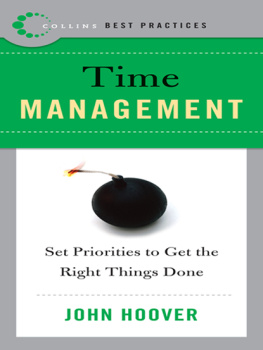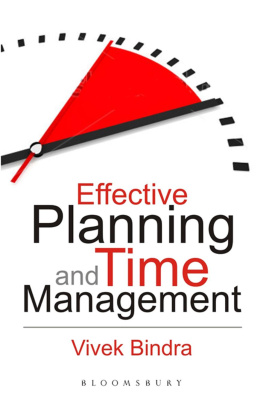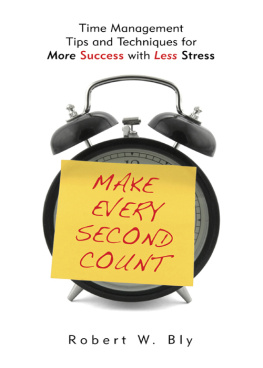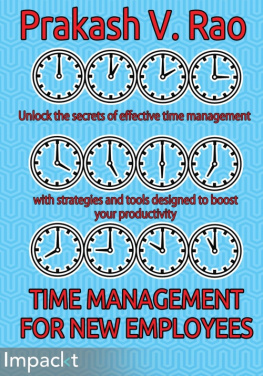Time is the scarcest resource of the manager; if it is not managed, nothing else can be managed.
Peter Drucker, management guru and author
(19092005)
T he 86,400 seconds in a day may sound like a lot, but they go fast. No matter how quickly time seems to fly by for you, even the most skilled time managers hours, minutes, and seconds tick by at exactly the same rate.
Self-Assessment Quiz
HOW DO YOU PERCEIVE TIME?
Read each of the following statements and indicate whether you agree, somewhat agree, or disagree. Then check your score and study the analysis at the end.
- Most of the things I do all day at work are mechanical and not personally gratifying.
Agree
Somewhat agree
Disagree - Most of the things I do all day are important to my employer but not to me.
Agree
Somewhat agree
Disagree - Most of the things I do all day are routine, and my employer doesnt really benefit from them either.
Agree
Somewhat agree
Disagree - At home, most of the things I do are routine and dont really benefit me or anybody else.
Agree
Somewhat agree
Disagree - At home, most of the things I do are important to other people but not to me.
Agree
Somewhat agree
Disagree - At home, most of the things I do are mechanical and not personally gratifying.
Agree
Somewhat agree
Disagree - My priorities are set by others at work.
Agree
Somewhat agree
Disagree - My priorities are set by others at home.
Agree
Somewhat agree
Disagree - If I had the choice, I would use my professional time much differently.
Agree
Somewhat agree
Disagree - If I had the choice, I would use my personal time much differently.
Agree
Somewhat agree
Disagree
S CORING
Give yourself 3 points for every question you answered Agree, 2 points for every question you answered Somewhat agree, and 1 point for every question you answered Disagree.
A NALYSIS
2330 | You see yourself as a victim who has been robbed of control over your time. You dont feel empowered to set your own priorities or to determine how your time is used. As a result, much, if not most, of your time feels wasted. |
1722 | You might be ambivalent about the demands on your time. You accept the fact that life is about compromise and have compromised yours out of necessity and apathy. |
1016 | You have a healthy outlook on how to use time and keep your priorities straight. In your life, you maintain a healthy balance between work and play. |
Some people seem to get so much more done. Its not because they have more time, however, its because of their skill at time management. Managing your time will positively affect your daily output, your career and financial goals, and, ultimately, your success.
Behind the Numbers
THE WASTED HOUR
A manager earning $75,000 per year who squanders just one hour a day due to lack of organization costs an employer some $9,000 per year. Using the same formula, heres what other comparable time-wasters cost their companies:
Salary | Lost annual profit |
$45,000 | $5,625 |
$55,000 | $6,874 |
$65,000 | $8,125 |
$85,000 | $10,625 |
$95,000 | $11,875 |
$105,000 | $13,125 |
$200,000 | $25,000 |
If all of these managers worked for the same firm, they would drain $81,294 from the companys bottom line each year.
SOURCE: The Organized Executive by Stephanie Winston (Warner Books, 2001).
Time is the substance of our lives, writes Alexandra Stoddard in her book, Time Alive. She explains that we dont create time in our lives but instead create our lives in time. But people too often feel that, in their personal and professional lives, time is running them. They feel they only have time for one lifepersonal or professionalbut not both. The difference in giving your time more meaning or making it more productive is not found in trying to speed up or slow down your days. It is what you choose to do within the time frames that constrain us all that makes the difference. Are you taking advantage of the time thats available to you?
One cannot even think of managing ones time unless one first knows where it goes.
Peter Drucker
Some people seem to have been born with a natural understanding of time management. Fortunately for the rest of us, its a skill that can be learned and developed. Leading organization expert and best-selling author Stephanie Winston claims that senior executives and CEOs seem to possess unique time management and organization skills that enable them to dramatically increase their productivity. Indeed, people who are good at managing their time have strong skills in several key areas. They have a clear vision of their big-picture goals at work and in lifelong-term, yearly, monthly, weekly, and daily goals. They are skillful at breaking these goals down into smaller units, and they know how to translate these small units into action-oriented to-do lists filled with tasks. Finally, they understand that achieving long-and medium-range goals means crossing off every task they can on their to-do list, every day.
The BIG Picture
PRIORITIES IN GOAL SETTING
Michael Gerber, the best-selling business author, explains that professional priorities are an essential element of a successful business. He believes that managers should set appropriate goals and then specifically choose to spend time on productive tasks that will help achieve those goals.









